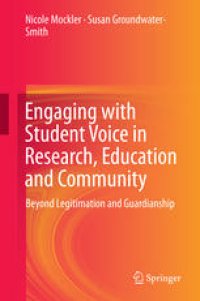
Ebook: Engaging with Student Voice in Research, Education and Community: Beyond Legitimation and Guardianship
- Tags: Educational Psychology, Sociology of Education, Educational Policy and Politics
- Year: 2015
- Publisher: Springer International Publishing
- Edition: 1
- Language: English
- pdf
This work interrupts the current “consulting students” discourse that positions students as service clients and thus renders more problematic the concept of student voice in ways that it might be sustained as a democratic process. It looks at student voice holistically across realms of classroom practices, higher education, practitioner inquiry and policy formulation. The authors render problematic the “empowerment” rhetoric that is the dominant and insufficient narrative justifying consulting children and young people. They explore the many contradictions and ambiguities associating with recruiting and encouraging them to participate and the varying impacts of different circumstances on the ways in which student voice projects are enacted. They perceive that it is possible for student voice projects to be subverted from both above and below as varying stakeholders with varying purposes struggle to manage and control projects. Importantly, the book reports on research that identifies and highlights conditions for initiating and sustaining student voice and include “beyond school” dimensions that consider young people as “audiences” who can inform community facilities, their development and design as well as undergraduate students in universities. These cases are not reported as celebratory, but rather act as narratives that illuminate the many challenges facing those who chose to work with young people in authentic ways. It both advances methodologies for engaging young people as active agents in the design and interpretation of research that concerns them and offers a critique of those methods that see young people as the objects of research, where the data is mined for purposes that do not recognise that students are the consequential stakeholders with respect to decisions made in their interests.
The purpose of this book is to interrupt much of the current rhetoric regarding the engagement of children and young people as consultants on the social and pedagogical practices of schooling. It argues that often giving students a voice in schooling is little more than requiring them to legitimate existing practices as a means of enhancing the marketability of the given school. The text does not limit itself to conditions of school education alone, but broadens the horizons to take in students in higher education, as well as young people in their interactions with cultural institutions and the wider community. It sees its mission as having a liberatory, democratic function engaging young people as active and knowledgeable agents in a wide series of social enterprises. It draws upon a range of cases and includes a range of practical examples for practitioners and researchers.